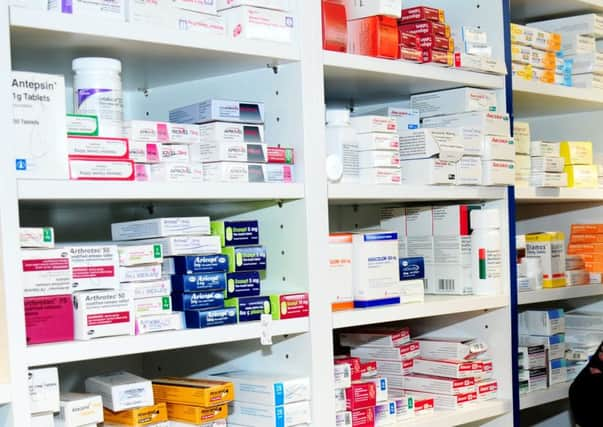Prescription charges could return to NI


Health Minister Jim Wells told MLAs his under-pressure department needed a cash injection to give patients greater access to new specialist medication such as cancer drugs.
Mr Wells said: “I repeat my belief that patients should have access to the drugs they need and I want to put funding for this on a secure financial footing.
Advertisement
Hide AdAdvertisement
Hide Ad“I cannot do this without finding a source of additional income.
“In view of the current financial position, and the need to invest in services, such as the provision of new specialist drugs, I believe that this may be an appropriate time to reconsider the provision of free prescriptions in Northern Ireland.”
Prescription charges were abolished in April 2010 by former minister for health Michael McGimpsey and cost the Department of Health about £0.6 billion a year.
Mr Wells said the current financial climate meant it was not “unreasonable” to ask people to contribute towards their prescriptions.
Advertisement
Hide AdAdvertisement
Hide AdA 12-week consultation on the issue opens today and will include a number of roadshows around Northern Ireland.
Mr Wells claimed there was an appetite for change.
“For some time now I have heard concerns raised by cancer patients and survivors, charities, the pharmaceutical industry and my colleagues in the Assembly that the existing process of providing access to new specialist medicines in Northern Ireland could be improved,” he added.
Although the exact mechanism for charges has not been confirmed, a “season ticket”-type system where patients would pay an annual subscription of between £20 and £25 could be introduced, the minister revealed.
The Department of Health is facing £165 million worth of financial pressures. It is estimated that a specialist medicines fund would cost between £5 million and £10 million a year.
Advertisement
Hide AdAdvertisement
Hide AdMr Wells said: “We need to accept that the changes proposed will carry costs and my department is currently facing significant pressures across the entire medicines budget.”
Meanwhile, an evaluation of the current IFR (individual funding request) system has made several recommendations for improvement, including the establishment of regional scrutiny committees to assess clinical applications for specialist medicines and greater transparency of the overall system.
The report, commissioned by former health minister Edwin Poots, has also recommended that the exceptionality criteria be amended to remove the reference to 95%.
Mr Wells said: “The review highlights how the current process can be strengthened and the subsequent recommendations point towards a number of areas which require action. These changes would make sure that patients have improved access to these drugs where clinicians feel they would make a difference, but would also introduce greater openness for clinicians and patients, as well as ensuring more robustly consistent decision-making.
Advertisement
Hide AdAdvertisement
Hide Ad“With these improvements, I believe the IFR process can remain an effective mechanism for providing access to specialist drugs for patients in Northern Ireland.”
The proposal received a mixed response from MLAs at Stormont.
Sinn Fein’s Maeve McLaughlin, chair of the health committee, called for greater clarity on exemptions.
She said: “The minister has talked up the concept of a specialised medicine fund and I think most people would accept that as a concept.
Advertisement
Hide AdAdvertisement
Hide Ad“However, can the minister, to the House clarify firstly, the current cost of waste in the system; the potential cost and savings of generic drugs; and indeed, importantly, the cost of the implementation of this scheme that he refers to today. And, if he is convinced that prescription charges is indeed the only answer, maybe he could clarify today to this House, given the huge inequalities, just how much exactly people will be expected to pay.”
SDLP health spokesman Fearghal McKinney said his party had “reservations” about tying a specialist medicines fund to the reintroduction of prescription charges.
Stewart Dickson, from the Alliance Party, branded the previous system “a shambles” and called for assurances that new revenue would not be spent on administration costs.
TUV leader Jim Allister asked for guarantees to ensure the charges would not “gallop” upwards.